Discography
 "Led Zeppelin 1" - release 12.01.69: Atlantic Records.
"Led Zeppelin 1" - release 12.01.69: Atlantic Records.
 "Led Zeppelin 2" - release 22.10.69: Atlantic Records.
"Led Zeppelin 2" - release 22.10.69: Atlantic Records.
 "Led Zeppelin 3" - release 05.10.70: Atlantic Records.
"Led Zeppelin 3" - release 05.10.70: Atlantic Records.
 "Led Zeppelin 4" - release 08.11.71: Atlantic Records.
"Led Zeppelin 4" - release 08.11.71: Atlantic Records.
 "Houses of the Holy" - release 28.03.73: Atlantic Records.
"Houses of the Holy" - release 28.03.73: Atlantic Records.
 "Physical Graffiti" - release 24.02.75: Atlantic Records.
"Physical Graffiti" - release 24.02.75: Atlantic Records.
 "Presence" - release 31.03.76: Swan Song Records.
"Presence" - release 31.03.76: Swan Song Records.
 "The Song Remains the Same" - release 28.09.76: Swan Song Records.
"The Song Remains the Same" - release 28.09.76: Swan Song Records.
 "In Through the Out Door" - release 15.08.79: Swan Song Records.
"In Through the Out Door" - release 15.08.79: Swan Song Records.
 "Coda" - release 19.11.82: Swan Song Records.
"Coda" - release 19.11.82: Swan Song Records.
 "Remasters vol.1" - release 08.10.90: Atlantic Records.
"Remasters vol.1" - release 08.10.90: Atlantic Records.
 "Remasters vol.2" - release 06.09.93: Atlantic Records.
"Remasters vol.2" - release 06.09.93: Atlantic Records.
 "Led Zeppelin Complete - Box Set" - release 06.09.93: Atlantic Records
"Led Zeppelin Complete - Box Set" - release 06.09.93: Atlantic Records
 "Page & Plant - No Quarter" - release 07.11.94: Phonogram Records
"Page & Plant - No Quarter" - release 07.11.94: Phonogram Records
 "BBC Sessions" - release 11.11.97: Atlantic Records.
"BBC Sessions" - release 11.11.97: Atlantic Records.
 "Led Zeppelin - Early days" - release 1999: Atlantic Records
"Led Zeppelin - Early days" - release 1999: Atlantic Records
 "Led Zeppelin - Latter days" - release 2000: Atlantic Records
"Led Zeppelin - Latter days" - release 2000: Atlantic Records
 "How the West was Won" - release 27.05.03: Atlantic Records
"How the West was Won" - release 27.05.03: Atlantic Records
 "Very Best Of " - release 2003: Atlantic Records
"Very Best Of " - release 2003: Atlantic Records
[ USA only ]
- " Communication Breakdown/Good times, Bad times " (10.03.69)
- " Whole Lotta Love/ Livin' Lovin' Maid " (07.11.69)
- " Immigrant Song/Hey Hey What can I do " (05.11.70)
- " Black Dog/Misty Mountain Hop " (02.12.71)
- " Rock and Roll/ Four Sticks " (21.02.72)
- " Over the Hills and Far away/Dancing Days " (24.05.73)
- " D'Yer Maker/ The Crunge " (17.09.73)
- " Trampled Underfoot/ Black Country Woman " (02.04.75)
- " Candy Store Rock/Royal Orleans " (18.06.76)
- " Fool in the Rain/ Hot Dog " (07.12.79)
- " Whole Lotta Love/ Livin' Lovin' Maid " (07.11.69)

"The Song Remains the Same" - release 1999: Warner Bros.
"No Quarter - Unledded Dvd" - release 1995: Atlantic/Warner Bros Records.
"How the West was Won Dvd" - release 2003: Atlantic/Warner Bros Records.
~ Led Zeppelin ~
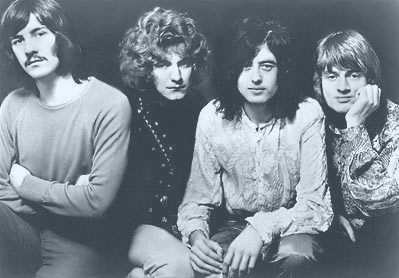
- Robert (Anthony) Plant
- [b. 09.01.44 - Heston, Middlesex, UK]. Vocals, Harmonica
- Jimmy (Patrick) Page
- [b. 20.08.48 - Bromwich, Staffordshire, UK].
Guitars, Pedal Steel Guitar - John Paul Jones
- [b. 03.01.46 - Sidcup, Kent, UK].
Bass, Keyboards, Acoustic Guitars - John (Henry) Bonham
- [b. 31.05.49 - Redditch, Worcestershire, UK
~ died 25.09.80 - Windsor].
Drums, Percussion.
Biography
(cont.. from page 1)
 1970 - Zeppelin began the year in the UK, touring and promoting "Zeppelin 2", with dates added for Australia and Asia. In Copenhagen they were forced to play under the pseudonym, "The Nobs", as the Countess Eva von Zeppelin objected to the use of her family name by the band, (fair enough!).
Zeppelin were now in demand around the globe, and having to turn down offers of TV spots and tour dates. They returned to the UK, again for the Bath festival, turning down an estimated $200,000 for appearances in Boston. At the Bath festival they reappeared for five! encores.
1970 - Zeppelin began the year in the UK, touring and promoting "Zeppelin 2", with dates added for Australia and Asia. In Copenhagen they were forced to play under the pseudonym, "The Nobs", as the Countess Eva von Zeppelin objected to the use of her family name by the band, (fair enough!).
Zeppelin were now in demand around the globe, and having to turn down offers of TV spots and tour dates. They returned to the UK, again for the Bath festival, turning down an estimated $200,000 for appearances in Boston. At the Bath festival they reappeared for five! encores.
After receiving gold awards for both "Zeppelin 2" and US single "Whole lotta love", the group retreated to a small cottage in Snowdonia, Wales, UK called "Bron-y-aur". It was now spring, and the surrounding view of the Welsh mountains and countryside inspired the writing and recording for the bands third album. By May, they had returned to Headley Grange studios to record ten new tracks.
October sees the release of their third album titled, "Zeppelin 3", to a somewhat mixed reception. The album was very much a contrast to the former albums, and could even be classed as folk-rock. With acoustic tracks including "Friends", "Tangerine", and "That's the way", "Bron-y-aur stomp", and a reworking of traditional blues ballad, "Gallows pole", as well as a tribute to friend and folk musician Roy Harper, "Hats off to Harper". Zeppelin had shown a different hand to their writing skills. With the contrasting power and drive of "immigrant song", (about Viking pillagers from across the North sea), and "Celebration day", the album also includes the blues epic, "Since I've been loving you", which would become a cornerstone for Zeppelin's stage performances. The themes and the production clarity of the whole album has created a rock masterpiece, and is arguably Zeppelin's finest moment.
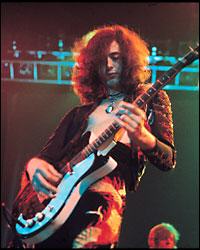 For the remainder of the year the band tour again, beginning with Japan. They were the first rock band of the '70s to tour Japan and were warmly greeted by the Japanese rock fans. Zeppelin donated the proceeds from one concert to the victims of the 1945 Hiroshima atomic bomb, and received an official letter of gratitude from the mayor of the city.
For the remainder of the year the band tour again, beginning with Japan. They were the first rock band of the '70s to tour Japan and were warmly greeted by the Japanese rock fans. Zeppelin donated the proceeds from one concert to the victims of the 1945 Hiroshima atomic bomb, and received an official letter of gratitude from the mayor of the city.
On return to the UK, Zeppelin began recording for their fourth album, but then paused to tour again. This time choosing only small venues around the UK. The idea was to access as many fans and venues as possible. But the downside was the under estimation of response, with twice as many fans arriving for gigs than these small venues could hold. Often the fans would be disappointed and take out their frustrations when they could not get in. This lead to some negative media headlines for Zeppelin, and when they came to play the Vigorelli Stadium in Milan, Italy, in front of some 15,000 fans, the over reaction of security police provoked a crowd riot early on, that ruined the performance. With police charging the crowd with batons and using tear gas, Zeppelin had no choice but to abandon the gig.
1971 - Zeppelin release their fourth album, titled... yes you guessed it - "Zeppelin 4", (a.k.a "Four Symbols" and "Runes"). The album cover was a double sided photograph of a derelict house with a single picture of an old man carrying a bundle of sticks - there was no album title or band name on the outside cover, (this really signifies the position Zeppelin had now reached with their fans and record label alike, with no need to promote themselves, any news of Zeppelin or the groups releases were swiftly realised by word of mouth).
The album was their heaviest and loudest yet, again a complete contrast to the previous album "Zeppelin 3". This album blasted from the onset, firstly with "Black dog", derived from another excellent John Paul Jones bass line, then "Rock and Roll", a track that captured the vitality of Led Zep live. Then down a step with the mystical "Battle of Evermore" with Plant sharing dual vocals with the late, great, Sandy Denny, ("Fotheringay"). Last but very much not least, side one finishes with the immortal "Stairway to Heaven", the song Zeppelin have long been associated with since, with fans still voting it as the best rock song ever, even in today's radio and media polls.
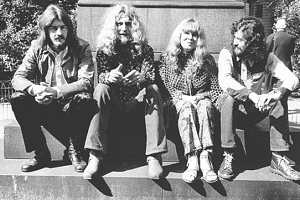 Side two opens with "Misty mountain hop", with shifting rhythm and riff, and humorous lyrical about hippies and dope. "Four sticks" is exactly that, John Bonham playing with four sticks to staccato guitar and wailing harmony by Plant. "Going to California" is another classic acoustic track, and finally "When the levee breaks", a re-working of a Memphis Minnie blues track dating back to the 1920's, (which seems strangely relevant in the light of the recent disastrous consequences of Hurricane Katrina 2005).
Side two opens with "Misty mountain hop", with shifting rhythm and riff, and humorous lyrical about hippies and dope. "Four sticks" is exactly that, John Bonham playing with four sticks to staccato guitar and wailing harmony by Plant. "Going to California" is another classic acoustic track, and finally "When the levee breaks", a re-working of a Memphis Minnie blues track dating back to the 1920's, (which seems strangely relevant in the light of the recent disastrous consequences of Hurricane Katrina 2005).
1972 - February, and Zeppelin were again touring, this time Australia and New Zealand, playing to crowds of 25,000. Taking time out to write and record new tracks, the band wound up '72 playing at Alexandra Palace, UK.
1973 - March sees the release of Zeppelin's fifth album, this time with a title, "Houses of the Holy". The cover, again double folded with no name or title on the outside, depicts a collage of children climbing across rocks to reach the peak, (the picture is the giants causeway, Ireland), coloured in bright Orange and yellow. Side one opens with "The song remains the same" a vibrant and summer song, that blends straight into "The Rain song", a slow ballad of vocal and guitar harmony synonymous with Page and Plant. Then an acoustic masterpiece titled "Over the hills and far away". Side one finishes with a rather curious departure into soul and funk, with "The Crunge", a song that could almost be dedicated to James Brown, complete with lyric, "...take me to the bridge". Side two opens with "Dancing Days", featuring slide guitar, then another divergence, "D'yer maker", a reggae styled track, (title coined from the old joke...my wife went to the west Indies.... really Ja-maica?). The album then moves onto the more profound, with the mystical "No Quarter", (also to become another stage set piece for Zeppelin). Finally the album finishes with a chant rocker, "The Ocean", a tribute to Zeppelin fans for the fans.
Not without their sense of humour, or maybe just naively, Zeppelin could often drop and mix tracks together, that, for any other band, would appear clumsy. Or maybe, in the case of "Houses of the Holy", the real deal were the foundation tracks "The song remains the same", "Rain Song", "Over the hills.." and "No Quarter". The album was received with mixed reviews. Praised by critics, whilst fans were not really that sure. Despite this, the album reached #1 in most countries.
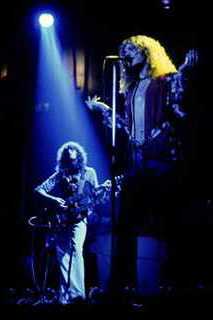 Touring in '73, the Zeppelin live experience was now a much more extravagant affair, with stage effects and live set pieces. Zeppelin were playing to stadium crowds of 40,000, and managed a record of 56,800 fans at Tampa bay stadium, Florida. Putting them in the "Guinness book of world records", and surpassing the record formerly held by the "Beatles". Zeppelin were now top of the tree, and flying in their own private Boeing jet between continents. Was it all getting too big?
Touring in '73, the Zeppelin live experience was now a much more extravagant affair, with stage effects and live set pieces. Zeppelin were playing to stadium crowds of 40,000, and managed a record of 56,800 fans at Tampa bay stadium, Florida. Putting them in the "Guinness book of world records", and surpassing the record formerly held by the "Beatles". Zeppelin were now top of the tree, and flying in their own private Boeing jet between continents. Was it all getting too big?
The answer was no, not yet at least. It was time Zeppelin were recorded live, and what better way than a movie! (not so surprising as it may seem, in the days before video, and dvd). Zeppelin were filmed for three nights at Madison Square garden, New York in July 1973. The film included the band live, inter-cut with behind the scenes footage of the venue, the city and fans, and road crew. With cutaways and fantasy scenes amongst the backing soundtrack of the concert. the soundtrack was recorded but would not be released until the film was finished later in 1976.
With the US tour completed, the band returned home for some well earned R'n'R and family time. Page retired briefly to his home in Scotland, "Boleskin", the home formerly owned by the occultist "Alistair Crowley". It has often been speculated of Page's curious interest in the occult, and the success of Zeppelin. Yet, it could be said, the mystique that surrounded rock's #1 guitar hero, and indeed, all the members of the group, was more for the sake of privacy rather than eccentricity. Although he did also own an occult bookshop in Chelsea, west London.
1974 - The band began recording their sixth album. This was to be a double album, with a mix of tracks, half of which were already written in some stage or another. The album would be released on Zeppelin's own record label, licensed under Atlantic records, called "Swan Song". (Other artists included on this label would be "Bad Company", "The Pretty things" and "Roy Harper", amongst others). In fact, the first release for Swan Song records was "Bad Company" which reached #1 in the US, (line-up included Paul Rodgers on vocals and Simon Kirke on drums, both formerly from rock band "Free").
1975 - February sees the release of the Zeppelin double album, "Physical Graffitti". With their most expensive record sleeve to date, depicting a New York tenement building, with see through windows, with which the double inner sleeve's matched to show through various miniature pictures, some of the band themselves. The album was a return to basics and real rock and blues, and made up in sheer volume for previous high expectations. The album contained fifteen tracks. Side one includes "Custard Pie", the customary upbeat rock opener, complete with innuendo. Then "The Rover", and finishing side one with an eleven minute epic blues thunder, "In my time of dying", where Bonham simply sounds as if he is smashing his drums, (Bonham was often known to 'break' drum kits in his earlier days, and it was fellow drummer Carmine Appice, who introduced him to endorse "Ludwig" drums - much harder to bust up).
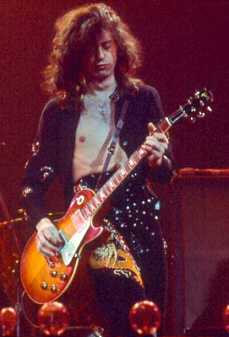 Side two starts off, with what would appear, to have been missed from the last album, the song "Houses of the Holy". Then "Trampled underfoot", (reputed as the only Zeppelin song you can dance to). Side two finishes with another mystical epic, "Kashmir", with lyric of time and space traveller to boot.
Side three begins with the excellent, "In the light", a song for the faithless, then acoustic solo "Bron-y-aur", and the soothing "Down by the seaside". Finishing with "Ten years gone".
Side four includes, "Night Flight", a bright country blues number, then the staccato style "Wanton song", "Boogie with the stu", and "Black country woman", both raw trad blues numbers, and finishing with the lazy "Sick again".
Side two starts off, with what would appear, to have been missed from the last album, the song "Houses of the Holy". Then "Trampled underfoot", (reputed as the only Zeppelin song you can dance to). Side two finishes with another mystical epic, "Kashmir", with lyric of time and space traveller to boot.
Side three begins with the excellent, "In the light", a song for the faithless, then acoustic solo "Bron-y-aur", and the soothing "Down by the seaside". Finishing with "Ten years gone".
Side four includes, "Night Flight", a bright country blues number, then the staccato style "Wanton song", "Boogie with the stu", and "Black country woman", both raw trad blues numbers, and finishing with the lazy "Sick again".
The album was an instant hit, and had been eagerly awaited after the indifference towards the previous album. With speculation of the impending film release also looming, Zeppelin were out to play Earl's Court, London, in May. Their first UK dates for two years. With Zeppelin known for their endurance on stage, these performances would last more than three hours! The follow up international tour took the band from the UK to the US and Japan. August, and the band take a vacation, but unkindly for Robert Plant and family who are involved in a motor car accident in Greece, with both Plant and his wife spending a number of weeks in convalescence.
